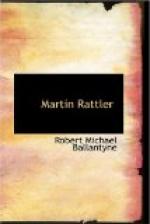“And what do you do with them, Barney, when they are found?” inquired Martin.
“Sind them to Rio Janeiro, lad, where my employer sells them. I don’t know how much he makes a year by it; but the thing must pay, for he’s very liberal with his cash, and niver forgits to pay wages. There’s always a lot o’ gould-dust found in the bottom o’ the bateia after each washing, and that is carefully collected and sold. But, arrah! I wouldn’t give wan snifter o’ the say-breezes for all the di’monds in Brazil!”
As Barney said this he entered his cottage and flung down his hat with the air of a man who was resolved to stand it no longer.
“But why don’t you wash on your own account?” cried Martin. “What say you; shall we begin together? We may make our fortune the first week, perhaps!”
Barney shook his head. “No, no, boy; I’ve no faith in my luck with the di’monds or gould. Nevertheless I have hear’d o’ men makin’ an awful heap o’ money that way; partiklarly wan man that made his fortin with wan stone.”
“Who was that lucky dog?” asked Martin.
“Well, ye see, it happened this way: There’s a custom hereaway that slaves are allowed to work on Sundays and holidays on their own account; but when the mines was a government consarn this was not allowed, and the slaves were the most awful thieves livin’, and often made off with some o’ the largest diamonds. Well, there was a man named Juiz de Paz, who owned a small shop, and used to go down now and then to Rio de Janeiro to buy goods. Wan evenin’ he returned from wan o’ his long journeys, and, being rather tired, wint to bed. He was jist goin’ off into a comfortable doze when there came a terrible bumpin’ at the door.
“‘Hallo!’ cried Juiz, growlin’ angrily in the Portugee tongue; ’what d’ye want?’
“There was no answer but another bumpin’ at the door. So up he jumps, and, takin’ down a big blunderbuss that hung over his bed, opened the door, an’ seized a Naygur be the hair o’ the head!
“‘Oh, massa! oh, massa! let him go! Got di’mond for to sell!’
“On hearin’ this, Juiz let go, and found that the slave had come to offer for sale a large di’mond, which weighed about two penny-weights and a third.
“‘What d’ye ask for it?’ said Juiz, with sparklin’ eyes.
“‘Six hundred mil-reis,’ answered the Naygur.
“This was about equal to £180 Stirling. Without more words about it, he paid down the money; and the slave went away. Juiz lost his sleep that night. He went and tould the neighbours he had forgot a piece of important business in Rio and must go back at wance. So back he went, and stayed some time in the city, tryin’ to git his di’mond safely sold; for it was such a big wan that he feared the government fellows might hear o’t; in which case he would have got tin years transportation to Angola on the coast of Africa. At last, however, he got rid of it for 20,000 mil-reis, which is about £6000. It was all paid to him in hard dollars; and he nearly went out o’ his wits for joy. But he was brought down a peg nixt day, when he found that the same di’mond was sold for nearly twice as much as he had got for it. Howiver, he had made a pretty considerable fortin; an’ he’s now the richest di’mond and gould merchant in the district.”




